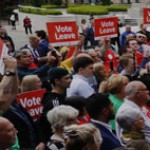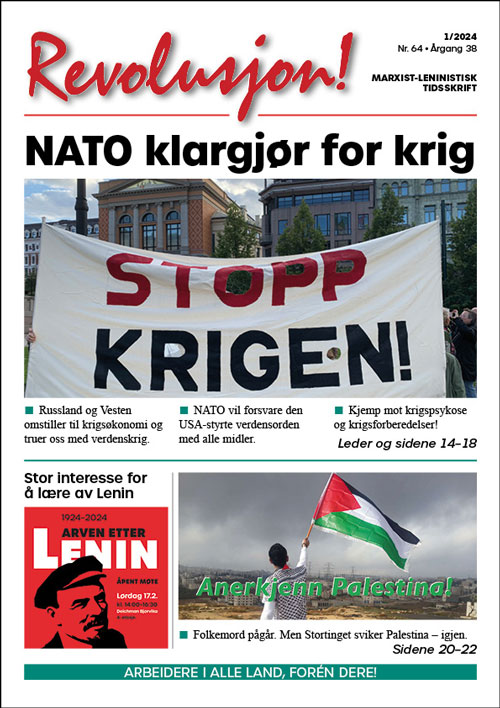The people have spoken up against the establishment. 52 percent of the Britons want to get out of the European Union under the slogan 'Take Control'.
 Scaremongering failed to convince a majority of UK citizens to remain in the EU. The outcome of the referendum has infuriated finance capital and its politicians. Mainstream media channels and European newspapers have been floded with sorrow declarations and disaster alerts.
Scaremongering failed to convince a majority of UK citizens to remain in the EU. The outcome of the referendum has infuriated finance capital and its politicians. Mainstream media channels and European newspapers have been floded with sorrow declarations and disaster alerts.
Attempted incrimination
EU supporters at home and abroad accuse half the Britons of having racist sentiments. They claim that the elderly by their voting have deprived the youth of a future in ”Europe”. The economic forecasts predict recession in Europe – as if that were a new phenomenon.
The hallmark of the anti-EU movement is the rebellion against the dictates from Brussels and reclaiming democracy.
Admittedly, the rightwing Independence Party (UKIP) has tried to profit from xenophobia on several occasions. But this has not characterized the Leave campaign as such, neither on the part of its leftist sectors nor from the dominating Tory breakaway group spearheaded by the former Mayor of London, Boris Johnson. The hallmark of the EU opposition in Britain – as everywhere else – is and has been the rebellion against the dictates from Brussels and the abolishment of democracy and national sovereignty.
Being an old colonial power, Britain has a long tradition of immigration from Commonwealth countries, especially from the Indian subcontinent. However, these immigrants have since 2008 been met with a discriminatory "points system", while residents in the EU/EEA can immigrate and establish themselves freely. Net immigration from the EU has increased ten-fold. Massive labour migration by means of Temporary Employment Agencies has led to social dumping on a large scale, like in Norway. It is primarily the consequences of the free flow of labour following the expansion of the EU in 2004 that British workers have reacted against, not immigration as such.
The working class voted Leave
It was taken for granted that the working class would follow the instructions from the head of the Labour party and the union bosses in TUC to vote "Remain." Especially so because Labour leader Jeremy Corbyn, from the party's left wing and with a record as an opponent of NATO and the EEC, encouraged them to “Stay in”. However, the workers did the opposite in Labour strongholds like Sunderland and other industrial cities. 64 percent of the workers voted Leave, according to a survey. That has been crucial for the Leave majority.
Brussels and the British financial elite could try to exploit the Northern Irish and Scottish discontent in order to undermine the vote.
The workers feel the same remoteness from institutionalised politics as other sectors of the population, but they are also particularly hit by austerity measures and welfare cuts from alternating reactionary governments. While EU requirements to decrease the budget deficit is being used as an argument for social austerity and the dismantling of the national health system, Britain transmits enormous monies to Brussels. Even after the "EU discount" they have negotiated, Britain still pays £13 billion to the EU and get £4.5 billion (about 45 billion NOK) back. About half of this return is transferred to Scotland, which helps to explain why a majority of Scots voted to stay in the EU.
Unresolved national questions
The referendum has taken the lid off several simmering national issues. In Northern Ireland as well, a majority voted to remain in the European Union, especially Republicans who fear that the border posts could be reinstalled between the Republic of Eire and the six northern counties. Both the Scottish First minister Nicola Sturgeon from the Scottish National Party (SNP) and Martin McGuiness and MEP Matt Carthy from Irish Sinn Fein have demanded a new referendum.
The Scots regard the EU as a tactical ally in the fight for secession, as it would be a paradox if they rid themselves of a central power in London only to submit to the European Central power in Brussels. Irish Sínn Fein consider EU as a backdoor possibility for Irish reunification.
The withdrawal process stated in the Lisbon Treaty can take up to two years, and a lot can happen along the way. One possible scenario in the long term is that Brussels and the British financial elite could try to exploit the Northern Irish and Scottish discontent in order to undermine the vote.
Elsewhere in Europe too, Brexit may cause repercussions, such as where the British rock of Gibraltar on the Mediterranean Sea is concerned; a strategic landmark that Spain naturally lays claim to (but where the parties have agreed to disagree as long as they have been under the same EU umbrella). In terms of British special advantages in some EU countries like Cyprus and Malta, complications will transpire in such as to the status of British bases.
New trade agreement
Just like under the referenda in Norway in 1972 and 1994, the scaremongering from big capital has been wild and fierce: Huge ads paid for by Goldman Sachs, Airbus and even Hungary's ultranationalist Prime Minister Jerzy Órban have voiced that hundreds of thousands of jobs will disappear, that prices will soar and that Europe will collapse.
This was the message until the 24th of June.
But suddenly it was not so bad after all. EU President Donald Tusk is now talking about a stronger (and more integrated) EU without the UK, while he the week before proclaimed doomsday for European political civilization if Britons bade the EU farewell.
Barely hours after the voting results were official, the German finance ministry presented a secret offer to the UK for an "association agreement", according to financial newspapers.
Several think tanks and economists are already suggesting that Britain should choose a "Norwegian solution".
A contagious infection
As anticipated, Brexit has already resulted in considerable contagion. The reactionary, nationalist and fascist parties in Europe are trying to exploit the people's national sentiments and their rebellion against the bourgeoisie and the financial elite. EU's own practice and policy has for years on encouraged such forces, whom the Brussels mafia pretend that they deplore. The so-called troika has appointed governments completely void of popular mandate in Italy; Brussels is actively supporting the corrupt and pro-fascist coup President of the Ukraine; they are making filthy deals with the authoritarian Erdogan regime in Turkey and have as their supreme chief a representative of a Polish regime with a penchant for political censorship, xenophobia and religious intolerance.
What is being ignored is that we are talking about large and predominantly democratic popular movements demanding influence over their own life and their own politicians. This is especially true where Denmark is concerned. Here the broad People's Movement against the EU has started to mobilize for a new referendum on Danish withdrawal from the European Union.
The dam has burst
 It was bound to happen sooner or later, but it is the British who have caused the dam to burst. The popular basis for the EU project has crumbled, and the EU will likely try to respond with an even tighter integration among the hard core of member states. The Franco-German bloc might grab the opportunity to strengthen itself, now that they need not pay attention to the Anglo-American 'Trojan horse', the United Kingdom. At a later stage this can lead to increased imperialist contradictions between the USA and the EU and within NATO. We will, however, experience a lot of internal friction before the new course manifests itself.
It was bound to happen sooner or later, but it is the British who have caused the dam to burst. The popular basis for the EU project has crumbled, and the EU will likely try to respond with an even tighter integration among the hard core of member states. The Franco-German bloc might grab the opportunity to strengthen itself, now that they need not pay attention to the Anglo-American 'Trojan horse', the United Kingdom. At a later stage this can lead to increased imperialist contradictions between the USA and the EU and within NATO. We will, however, experience a lot of internal friction before the new course manifests itself.
The peoples across Europe are tired of being run-over and ignored. They are tired of being doormats for finance capital and its rotten political system. They are tired of national sovereignty and democratic influence being wrested from them. It's a turbulent situation that reactionary and even fascist forces will try to feed upon. Thus it is even more important that all democratic and progressive forces involve themselves and do not leave the initiative to the reactionaries.
Illusions about the EU is to the advantage of the fascists
The biggest and most dangerous error democratic and left reformist forces and parties can make is to keep singing illusionary songs about a better European Union, a kinder and more social Union etc., as the European Left does. Illusion of this sort are in reality a helping hand to the anti-labour project of this Union of Capital. And worse: As the masses see through the false notion that the EU can be reformed into something better, they will look to the reactionary "nationalist" forces as the only credible alternative.
That would be a deadly development for Europe, since these forces are a breeding ground for racism and overt fascism. Ultimately, the European financial capital will put them in motion to terrorize the working class and all democratic forces while allowing the blackshirts to spit their venom against refugees, big capital, Bolshevism and "Jewish power." Fascism will grow and advance rapidly unless the progressive forces in Europe conquer and dominate the arena of popular opposition to the EU project. The left must assert ownership to the struggle for the national self-determination and democracy that monopoly capital has wrested from the peoples of Europe.
The struggle against the EEA Agreement is on the agenda!
In advance of of the British referendum, Erna Solberg (Norwegian Prime Minister from the Conservative Party – translator's note) systematically decried the Norwegian EEA-solution (the European Economic Area Agreement between three EFTA-countries and the EU – translator's note) and told the Britons that they would "hate" it because it is undemocratic! But following the final result of the British vote on Midsummer Eve, she states that Norway has an EEA-agreement that serves us very well!
As the UK is bound to find some kind of trade relation with the EU, focus will be put on The European Free Trade Association EFTA (where Britain was a member until 1975) and the EEA. There is already talk of an EEA+ with special advantages for the UK, as the British have clearly expressed that they will not accept any kind of intervention from Brussels. When proved that Britain can negotiate an agreement with the EU, it will inevitably tear the veil away from the idolatry of the holy EEA that has minted Norwegian political debate for decades. Not only No to the EU but also parties like the Centre Party and Red are now openly mouthing demands for a referendum on the agreement.
In an attempt to stifle the debate they are fearing, both Erna Solberg (H) and Jonas Gahr Støre (leader of the Social Democratic Labour Party – translator's note) anxiously argue that any debate on the EEA Agreement would be "irresponsible" in the dire times that lay ahead for Britain, the EU and Norway.
But this time they will not succeed in strangling the debate before it has begun!

